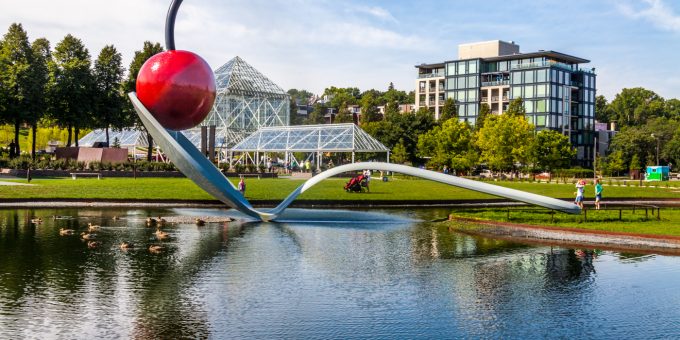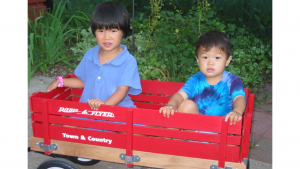
Today, The Society Pages reposts this original essay, written last summer as part of the Wonderful/Wretched series. Wonderful/Wretched is a collection of twenty-one essays on the racial dynamics of the Twin Cities written by social scientists with ties to the metro area in response to the killing of George Floyd. Wonderful/Wretched has since been revised and expanded in a published volume, Sparked: George Floyd, Racism, and the Progressive Illusion available through the Minnesota Historical Society. For the remainder of the summer, in celebration of Sparked’s publication, and in reflection of the year that has passed since last summer’s historic uprising for racial justice, The Society Pages will repost essays from Wonderful/Wretched in their original form.
The binary, wonderful/wretched, aptly describes the racial dynamics I experienced in the Twin Cities, Minnesota. On one level, I recall my life in Minnesota with affection and gratitude. From 1998 to 2004, I was as an assistant professor of American Studies at the University of Minnesota, Twin Cities. It was my first tenure-track position. My husband also landed a tenure-track job in the Twin Cities. Academic couples struggle with finding permanent employment in the same place. We had hit the jackpot early in our careers.
Our two children were born in Minnesota. One of the most pleasant ways we settled into family life there was through weekend outings in the Twin Cities and the surrounding areas. Through our walks around Lake Harriet to visits to the Walker Museum’s Minneapolis Sculpture Garden and its awesome cherry spoon sculpture to fruit-picking excursions in Afton Apple Orchard, we were becoming the typical Minnesotan family.
Except that we weren’t. I am Filipino American, and my husband is Korean and Chinese American. I could go into more detail about how both of us were born in the United States and how our family histories reflect a longstanding, multigenerational Asian American history. But in my mundane Minnesotan life, it didn’t matter. During my time there, my non-white, Asian racial difference generated some of my most indelible experiences of feeling like an outsider and of not belonging.

At one of our family outings to a food festival, I found myself separated from my husband and baby while waiting in line to buy something to drink on that humid summer day. A man behind me accused me of cutting in line.
“We have rules in this country,” he said to me.
I turned around to see his young white face sneering at me, his arm draped across the shoulders of his young, white, blond girlfriend who was laughing at me. I knew what he meant by in this country. The phrase conjures an ugly, centuries-old, white supremacist history with the act of coded speech. It draws the Orientalist line between “civilized” them and “uncivilized” you. It refers to the stereotype of Asians as perpetual foreigners, no matter how long Asian Americans have lived, worked, and died on behalf of this country.
I could have said or done something. Instead, I took a deep breath and let it go. Why? Because I was the only person of color in the crowd. I knew that others around us had heard what he said, yet I didn’t see a sympathetic face anywhere near me. I concluded it was safer for me to calmly complete my purchase and move on.
Self-preservation matters, but moving on from experiences like these isn’t so simple. They can haunt and hurt you by living inside of your head and heart. When I reconnected with my husband, I told him what had happened. One day, I said, I’m going to write about this.
I put that writing aside after another wretched experience. It involved encountering racist advertising on massive billboards from the then-trendy new Minneapolis restaurant Chino Latino. Taglines such as “As exotic as food gets without using the dog,” and “All the flavors without all the vaccines,” were perched high on the busy intersections of Minneapolis’s downtown and Uptown neighborhood for everyone to see.
When I spotted these billboards, I cringed in a moment of what W. E. B. Du Bois has called “double-consciousness.” A stream of oppressive racial and colonial images entered my mind: disease carrier, savage, dogeater. I wondered if that was how the people around me were seeing me.
That time, I wasn’t going to let it go. I released my angst into an essay, “Salvaging the Savage,” which was published in the anthology Screaming Monkeys: Critiques of Asian American Images, edited by M. Evelina Galang. The anthology’s title derives from a 1998 restaurant review in a Milwaukee magazine that referred to a Filipino child as a “rambunctious little monkey.” The anthology included many different works by various authors who were united in bringing attention to persistent racial and colonial inequalities. As James Baldwin has noted, “History is not the past. It is the present.”My essay was “my scream.” In it, I expressed this hope: “Through salvaging the savage, we learn a language with which to critique these representations, strip them of their innocence, and construct counter-narratives that challenge the imperialism and racism that inflict our daily lives.”
I advocate for an anti-imperialist and anti-racist world primarily through my writing. One of the most wonderful things about my time in Minnesota is that the U of M, faculty colleagues, and students supported my research and writing. The presence of Korean American adoptees in my U of M classes and their belief that their history mattered to Asian American studies were the major sources of inspiration for my second book, Global Families: A History of Asian International Adoption in America.
While living in Minnesota, I also completed the writing for my first book, Empire of Care: Nursing and Migration in Filipino American History. Empire of Care explored how and why the “developing” country of Philippines emerged in the late twentieth century to become the world’s leading exporter of professional nursing care for highly developed countries. I argued that the origins of this contemporary labor migration stemmed from early-twentieth-century U.S. colonization of the Philippines. U.S. colonial nursing training in the Philippines followed American professional nursing trends and required Filipino nurses to learn the English language.An outcome of this colonial history was the creation of a Filipino nurse labor force that was prepared to work in the United States. When critical nursing shortages and other health crises emerged in the post-World War II period, U.S. health care institutions recruited nurses from the Philippines. Since the 1960s, over 150,000 Filipino nurses have worked in the United States.
We see this colonial legacy today in the most tragic way through Filipino nurses’ deaths on the front lines of the COVID-19 pandemic. Like many Filipino Americans, I feel a deep sense of grief, but also anger. I’m sick and tired of the long history of Filipino nurses and other essential workers in the US being treated as disposable.
Today, Minnesotans might find themselves being taken care of by a Filipino nurse. As I wrote in the epilogue of Empire of Care, a group of Filipino nurses arrived in the Twin Cities in 2002 after several health care organizations hired more than one hundred Filipino nurses. The recruitment of Filipino nurses to care for Midwestern populations illuminates how global and transnational forces continue to transform America’s heartland.
I left Minneapolis in 2004 and I now live in Berkeley, California. But is it ever really possible to leave a place when you carry all that was wonderful and wretched from there with you? The grief and anger I felt as I learned about the killing of George Floyd are part of something much larger and deeper. We cannot simply say, that took place over there, and it does not affect me here. Black lives matter across any geographical border. My research and my own racial encounters confirm what I have known in my soul: our fates are inextricably linked. And they depend upon the recognition of Black humanity and dignity.In the midst of so much existential panic, I find myself ruminating with urgency about how to not solely build upon my previous research, but how to build a just society. How about you? How can we imagine our world anew in this country?
Berkeley, CA
Return to the Wonderful/Wretched Series introduction.
Link to purchase Sparked: George Floyd, Racism, and the Progressive Illusion
